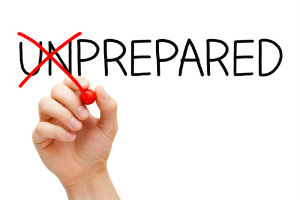What would you do if you found yourself without power for a week? Would you have non-perishable food to get by? Would you have enough medication on hand? What about flashlights?
Whether it’s a winter storm, a hurricane or a tornado, a natural disaster can strike at any time and sometimes without warning. A natural disaster can force you from your home or keep you confined in it.
Planning ahead can help you protect yourself and allow you to better cope with an emergency.
How to Get Prepared
Start by creating a disaster supplies kit. Collect enough supplies so you’ll have what you need for at least three days away from home and two weeks at home. Store these items in a duffle bag or suitcase with wheels and include a mix of basic need items, cold-climate supplies if you live in a cold area and supplies for your car, such as:
- 1 gallon of water per person per day
- A variety food that does not need cooking or refrigeration, like canned or dried items
- A can opener
- A flashlight with extra bulbs and batteries
- A first aid kit
- Seven-day supply of medications or supplies
- A multipurpose tool
- A cellphone with a charger
- Cash
- A change of clothing
- An extra set of keys
- Bottled water
- Jumper cables
Become aware of your community’s evacuation or emergency response plans. Many communities have Community Emergency Response Teams (CERTs) that provide assistance during emergencies. Other communities may have a neighborhood watch program or community block associations or faith-based organizations.
If you don’t drive and need to be evacuated, make arrangements with a neighbor, family member or friend to drive you, or find out if your community offers transportation in the event of an emergency.
Often, your home will be your shelter during an emergency, be aware of safe places in your house where you can take shelter in the event of a tornado, earthquake or other emergency. But if you do need to leave quickly, know the fastest way to exit your home and your neighborhood. You should be prepared to take your pets with you if you have to leave your home.
Keep copies of emergency phone numbers in an easily accessible area and keep copies of your vital documents like wills or Social Security cards in a safe location like a safe deposit box or fire-safe box.
Where to Get Information About Emergencies
Even though many communities have programs in place to serve and educate residents in the event of an emergency, there are other places you can stay up-to-date on emergencies and receive local instructions.
Local Emergency Alert System
Many times local television and radio stations will broadcast messages during severe weather or other emergencies.
NOAA Weather Radio
Weather radios are special radios designed to provide warnings and information in the event of severe weather. Radios can be programmed to alert you to weather emergencies in your area and can be purchased from many retailers.
What to Do In an Emergency
During a winter storm or chemical emergency, you may be told to stay home or “shelter in place.”
If you need to evacuate, try to carpool, wear appropriate clothing and shoes, take your emergency bag, lock your home, let an out-of-town contact know what is happening and where you’re going. You may need to go to a public shelter if your area is experiencing:
- Rising floodwater
- A lack of electrical power
- Your home has been severely damaged
Being prepared before an emergency happens can help you stay safe and ready to ride out unpleasant conditions.













